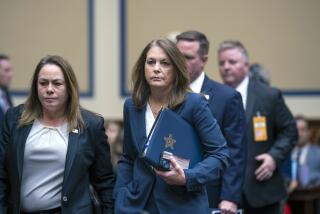Intelligence community coping with a ‘perfect storm,’ DNI head says

Director of National Intelligence James R. Clapper said Tuesday that the work of the intelligence community has been made more difficult in the last year by a “perfect storm” of events.
The budget for some intelligence programs has been cut by Congress, he said. The administration has decided to curtail some information-collection programs after leaks from former NSA contractor Edward Snowden revealed the scope of data on Americans being held by the National Security Agency.
Other documents leaked by Snowden have “endangered relationships” with allies, Clapper said, reducing the amount of information some foreign governments are sharing with the U.S.
On top of that, the threat of a terrorist attack against the U.S. is “still very, very real,” Clapper said, speaking at the Bipartisan Policy Center, a think tank in Washington. The threat from militant groups like Al Qaeda has spread globally and “morphed into more and more franchises,” he said.
As a result, the U.S. “is accepting more risk” than it was 10 years ago or even one year ago, Clapper said.
Clapper spoke at an event to mark the 10th anniversary of the release of the 9/11 Commission report, which set out a list of reforms the intelligence community should make to prevent another large-scale attack on U.S. soil. Most of the original recommendations, laid out a decade ago, have been enacted into law or adopted as policy, including the creation of the Office of the Director of National Intelligence to coordinate counter-terrorism efforts across the government.
Members of the commission on Tuesday, including former Republican governor of New Jersey Thomas H. Kean and former Democratic congressman from Indiana Lee H. Hamilton, called on the intelligence community to be more transparent about what information about Americans it collects.
“If these programs are as important as we believe they are, it is worth making the effort to build a more solid foundation in public opinion to ensure their preservation,” the commission concluded in a new document released Tuesday.
The commission also recommended that intelligence agencies brief more lawmakers about the classified data collection programs. Only eight leaders in Congress are informed about the scope of the programs.
”It imperils public and political support for these programs to limit classified briefings on their details (and often existence) to only eight leaders in Congress, known as the “Gang of Eight,” the report states.
The Senate is revising a House bill that would set limits on the bulk collection of data on Americans by the National Security Agency.
For more reporting on national security follow me on Twitter @ByBrianBennett.
More to Read
Sign up for Essential California
The most important California stories and recommendations in your inbox every morning.
You may occasionally receive promotional content from the Los Angeles Times.







